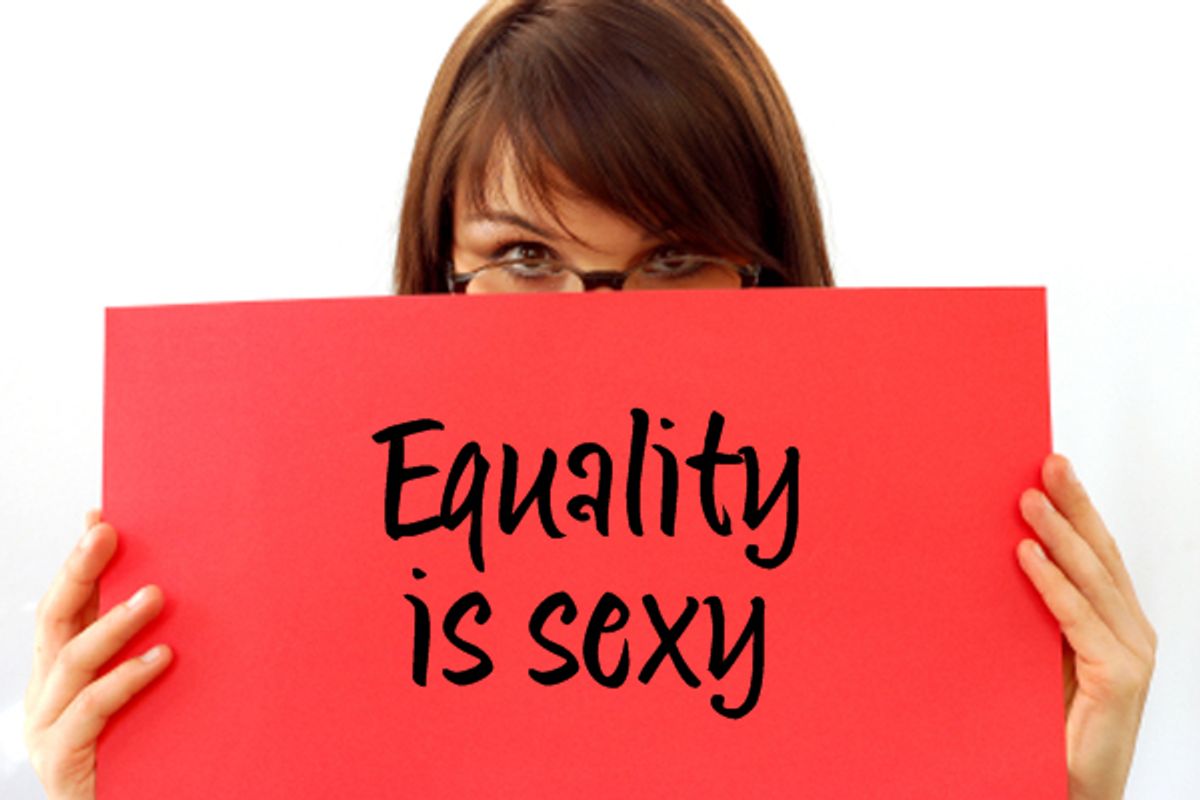The idea that "gender equality means more sex" seems like a slogan cooked up by cynical young feminists. Instead, it's the conclusion of a recent study by social psychologist Roy Baumeister of Florida State University -- and politically correct it is not.
His study, "Sexual Economics: A Research-Based Theory of Sexual Interactions, or Why the Man Buys Dinner," was presented Sunday at the American Psychological Association and shows that countries with greater gender equality have higher rates of sexual activity. With parity comes a greater likelihood of casual sex and more sexual partners. This might seem like excellent news, just one more argument in favor of equality -- and it is! But it also paints a mathematical, emotionless portrait of relations between the sexes.
Instead of using evolutionary or social constructionist theories, Baumeister turns to economic principles to explain sexual behavior. The result is a world where women use sex to get what they want from men -- whether it's a free dinner or a lifetime commitment. It's similar to an argument made by Mark Regnerus, author of "Premarital Sex in America: How Young Americans Meet, Mate and Think About Marrying," who talked to me earlier this year about his belief that feminist advances have driven down the price of sex to an all-time low in the U.S.
These are compelling theories and it's hard to argue with the cold, hard facts that they present -- but certainly economics alone can't adequately explain the complexities and idiosyncrasies of sexual and romantic relationships. It's also worth noting that despite this latest study's appearance of strict impartiality, it's clear from Baumeister's book, "Is There Anything Good About Men? How Cultures Flourish by Exploiting Men," that there is some serious gender politicking at hand. (Beyond the book's title, he repeatedly bemoans the "endless sexual deprivation that is the lot of many married men.")
Baumeister spoke to Salon by phone about how sex is like real estate, why female gossip regulates the sexual economy and whether his theory applies to love.
Why do we see this positive correlation between gender equality and sex?
The point of sexual economics is that sex is a resource that women have. Men trade women other resources for sex. Historically, women have restricted each other's sexuality in order to make the price of sex high, so that men pretty much have to make serious commitments of marriage in order to [have sex].
When women have more access to educational and financial opportunities, they don't need to hold sex hostage as much, so they relaxed the controls they've put on sexuality.
How do we know that women are withholding sex? Couldn't it also be that countries with great inequality regulate women's personal autonomy thereby constraining their access to sex?
That is not in evidence from this study. There is rather extensive previous work looking at cultural constraints and suppression of female sexuality; the thrust of that work is almost invariably that the pressure on women to restrict their sexuality comes from other women. It's really informal stuff, like gossip, bad reputations and so on. Even in countries like the United States, women say the pressure to restrain sexuality mainly comes from other women.
So, the motivation on the part of women to regulate each other's sexual behavior is to maintain the high value of sex?
Yeah. It's a bit like OPEC: You restrict the supply and you're going to drive up the price. When it comes to sex, women have the supply and men represent the demand. So, things fluctuate -- when you have a lot more men than women, then the price of sex is very high and those cultures tend to be very prudish. In contrast, when you have a surplus of women relative to men, then there's a lot of premarital and extra-marital sexual activity, and women can't demand too much in terms of commitment and fidelity in exchange for sex.
What is the motivator in more equal societies for women to have casual sex?
Almost all studies show that casual relationships appeal more to men than to women. Again, it's just a supply-and-demand thing. Economically, it's minority, not majority, rule. You try to sell a house, it helps if you have a lot of buyers and there aren't a lot of other sellers. But when there are a lot of houses on sale and people don't want to buy, then you have to lower your price.
It's not a very romantic theory.
No, it isn't. How does love factor into this?
You can have sexual norms and still have plenty of love, and you can have plenty of love when sex is very permissive. I think this is a little independent of love. It just again indicates that men are usually ready to move the relationship along at a sexual pace before the women are.
How should we look at the situation of casual-sex-having women in more equal societies: Have they lost their sexual bargaining power, or have they gained sexual freedom?
Both factors are there. Certainly it's easier for women to enjoy sex, but there is a sense among many women that they were better off when the price of sex was higher and men had to invest more before having sex. We're not making a value judgment, aside from that we're in favor of equality -- but we don't have a strong moralistic stance about sexuality either way.
It comes down to the fact that if sex is a woman's only ticket to a good life then she needs to get a really good return on that, but that isn't as important when women have a higher level of equality.



Shares